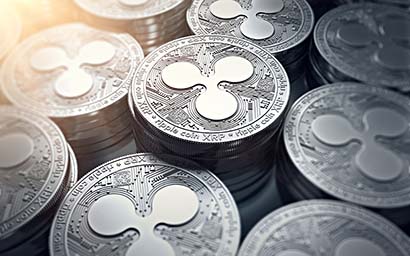 Cryptocurrency funds are launching across Asia and big investors are taking an interest. But will the likes of bitcoin ever become a mainstream asset class? Cybil Huichen Chou reports.
As the cryptocurrency frenzy sweeps the world, Asian family offices, private banks and high-net-worth individuals are vying for an early-mover advantage. A slew of crypto funds have been set up or planned in Asia to tap the ascending demand.
Nevertheless, the region’s public funds have largely remained on the sidelines, shunning the highly volatile and largely unregulated world of digital currencies.
Industry experts say supportive regulation is needed to encourage institutional investors to allocate to this asset class. Will policymakers see past the risks to unlock the potential reward?
Funds on the rise
Cryptocurrency funds are launching across Asia and big investors are taking an interest. But will the likes of bitcoin ever become a mainstream asset class? Cybil Huichen Chou reports.
As the cryptocurrency frenzy sweeps the world, Asian family offices, private banks and high-net-worth individuals are vying for an early-mover advantage. A slew of crypto funds have been set up or planned in Asia to tap the ascending demand.
Nevertheless, the region’s public funds have largely remained on the sidelines, shunning the highly volatile and largely unregulated world of digital currencies.
Industry experts say supportive regulation is needed to encourage institutional investors to allocate to this asset class. Will policymakers see past the risks to unlock the potential reward?
Funds on the rise“The asset managers’ appetite for setting up crypto funds has been robust in Hong Kong over the past four or five months. We get new enquiries from new crypto-related funds every day,” says Jolyon Ellwood-Russell, a Hong Kong-based banking and finance partner at law firm Simmons & Simmons. The majority of these funds are structured as hedge funds or private equity funds to reflect their private nature and substantial inherent risks. Crypto funds in Asia are evolving with sophistication, exploring various strategies beyond just bitcoins, he says. For example, in December, Singapore-based fund manager Helvetic Investments initiated a regulated, open-ended cryptocurrency fund that it claims is the first institutional-grade, diversified crypto-investment fund launched from Asia. The $200 million fund caters to family offices, accredited and institutional investors, and while it invests primarily in a diversified basket of the top 15 cryptocurrencies, it plans to extend investment into the stocks of blockchain-oriented companies or coupon-yielding bonds of countries and enterprises embracing distributed ledger technology. Another fund is from Swiss-Asia in Singapore. The $10 million hedge fund targets Asian high-net-worth individuals, family offices and funds of funds, but not institutional investors, with a portfolio of investments in initial coin offerings (ICOs) and secondary markets, the ancillary sectors, cryptocurrency futures contracts and related derivatives. “This is the first alternative quantitative systematic crypto fund in Singapore. Our investors do not have crypto assets in their portfolios at the moment, but some select risk-prone clients are looking at a small portion of 1% or 2% to start off with,” says Steve Knabl, managing partner and chief operating officer of Swiss-Asia. The firm claims investors in the fund can expect a 35% annual return. Roadblocks
Asian private equity funds and venture capitalists are also exploring strategies to delve into the digital currency space. Damian Adams, Singapore-based partner of Simmons & Simmons says: “The investment targets of a private equity fund very much depend on its particular investment strategy and whether that strategy focuses on investing, in traditional fashion, in the equity of an organisation conducting an ICO, or in the underlying token economy itself through purchase of tokens, or a combination of both.” An interesting development in this area is the recent establishment by Canadian pension giant OMERS of an Ethereum-focused public company that is aiming to raise $50 million to buy controlling stakes in Ethereum-based businesses and to invest in Ethereum itself. For investors who directly trade cryptocurrencies, the top five coins account for their most traded products. SJ Oh, vice president of Octagon Strategy, an over-the-counter trading platform for digital assets, says: “While we do endeavour to accommodate other altcoins, the bread and butter of our business comes from the top five coins and, as evident from the recent price action, the risk/volatility from these coins alone is plenty for the majority of institutions. Additionally, accumulating a position in altcoins and token sales is one thing, but to unwind in a bear market is another. I believe this is one of the biggest roadblocks investors encounter.” Family appetites
While money from Asian family offices is highly sought after by crypto funds, these wealthy families also scout for blockchain-based ICOs with proven track records and good reputations. “Asian family offices are rarely angel investors but rather later-stage capital for already successful start-ups,” says Eva Law, chair of the Association of Family Offices in Asia.
Law says that while family offices acknowledge that cryptocurrencies and blockchain technologies will transform the economy, they don’t deem these instruments to be core assets, most likely allocating less than 1% of their investable assets in these vehicles. Not all Asian family offices are aficionados of crypto. Chinese families in the old economies like industrial, manufacturing, energy and mining are likely to be more conservative. Stephen Pau, chief investment officer of China-based Hefeng Family Office, says: “Synergy with their core businesses, asset liquidity and a simple easy exit strategy are primary concerns for Chinese families in the traditional sectors when mulling investments.” Pau explains that these Chinese families target 4%-8% return on average and call for liquidity of their cash flows from their investments. Highly speculative digital coins or crypto funds entailing multi-year investment horizons and structured with complicated exit strategies would not be attractive to them. Public funds hesitate
Unlike asset managers, private banks or family offices in Asia, the region’s pension schemes, sovereign wealth funds, insurance companies and endowments seem to have remained on the sidelines of crypto assets. One exception is the National Pension Service (NPS) of South Korea, the world’s third-largest pension scheme. Last January, NPS reportedly invested $2.44 million into four companies that operate cryptocurrency exchanges in Korea. These trade the likes of Korbit, Bithumb, Upbit and Coinplug through two venture capital funds. The companies include Kakao Stock, which runs Upbit and is one of the world’s largest cryptocurrency exchanges. Large investors take a cautious stance for good reasons. Last February, Hong Kong’s Securities and Futures Commission (SFC) issued a statement alerting investors to the potential risks of dealing with cryptocurrency exchanges and ICOs. Following a cautionary statement on ICOs released last September, the SFC has taken regulatory action against a number of cryptocurrency exchanges and issuers of ICOs. The Monetary Authority of Singapore issued a similar warning in December. New asset classes
While the digital currency market is sniffed at by many naysayers who are suspicious of its sustainability, evangelists in Asia have experimented with new investment products that they believe will become a legitimate asset class in the future. Last August, Japanese financial information firm Fisco issued the country’s first bitcoin-backed bond. The news followed other announcements in the US of plans to issue bitcoin options, futures and an exchange-traded fund (ETF) tracking bitcoin derivatives. Analysts said that a bitcoin-backed bond would allow large institutions to store value using the digital currency and potentially be more open to accepting bitcoin as payment.
Other crypto-based asset classes might be in the offing in Asia as well. Ellwood-Russell of Simmons & Simmons says: “We have seen a very wide variety of crypto assets being looked at as investments. This includes the typical cryptocurrencies. It also includes anything from ICO assets, crypto-related derivatives and even generating income revenues from lending against crypto as collateral. In the future, I am sure the assets will include crypto-related ETFs and exchange-traded notes.” Will crypto funds be a mainstream investment product in the long run? “This will depend on regulations – whether they are too restrictive or whether they help to buoy up this new asset class,” says Knabl of Swiss-Asia. “With stronger due diligence and checks and sound investment strategies backed by proven investment algorithms and techniques, we can slowly gain the institutional investors’ confidence and increase the acceptance of crypto funds as a viable asset class. This will invariably have to pass by very robust controls with stringent checks and balances.” ©2018 funds global asia

 At times like these, HSBC Asset Management easily pivots towards emerging markets.
At times like these, HSBC Asset Management easily pivots towards emerging markets. A comprehensive, cost-effective, and transparent currency overlay hedging solution is crucial to mitigate FX exposure risks in the complex landscapes of Japan and China's FX markets, explains Hans Jacob Feder, PhD, global head of FX services at MUFG Investor Services.
A comprehensive, cost-effective, and transparent currency overlay hedging solution is crucial to mitigate FX exposure risks in the complex landscapes of Japan and China's FX markets, explains Hans Jacob Feder, PhD, global head of FX services at MUFG Investor Services. The world is transitioning from an era of commodity abundance to one of undersupply. Ben Ross and Tyler Rosenlicht of Cohen & Steers believe this shift may result in significant returns for commodities and resource producers over the next decade.
The world is transitioning from an era of commodity abundance to one of undersupply. Ben Ross and Tyler Rosenlicht of Cohen & Steers believe this shift may result in significant returns for commodities and resource producers over the next decade. Ross Dilkes, fixed income portfolio manager at Wellington Management, examines the opportunities and risks for bond investors presented by the region’s decarbonisation agenda.
Ross Dilkes, fixed income portfolio manager at Wellington Management, examines the opportunities and risks for bond investors presented by the region’s decarbonisation agenda. Shareholders in Japan no longer accept below-par corporate governance standards. Changes are taking place, but there are still areas for improvement, says Tetsuro Takase at SuMi Trust.
Shareholders in Japan no longer accept below-par corporate governance standards. Changes are taking place, but there are still areas for improvement, says Tetsuro Takase at SuMi Trust. Robert St Clair, head of investment strategy at Fullerton Fund Management, explores the reasons investors should be paying attention to the rising demand for healthcare in China.
Robert St Clair, head of investment strategy at Fullerton Fund Management, explores the reasons investors should be paying attention to the rising demand for healthcare in China.


